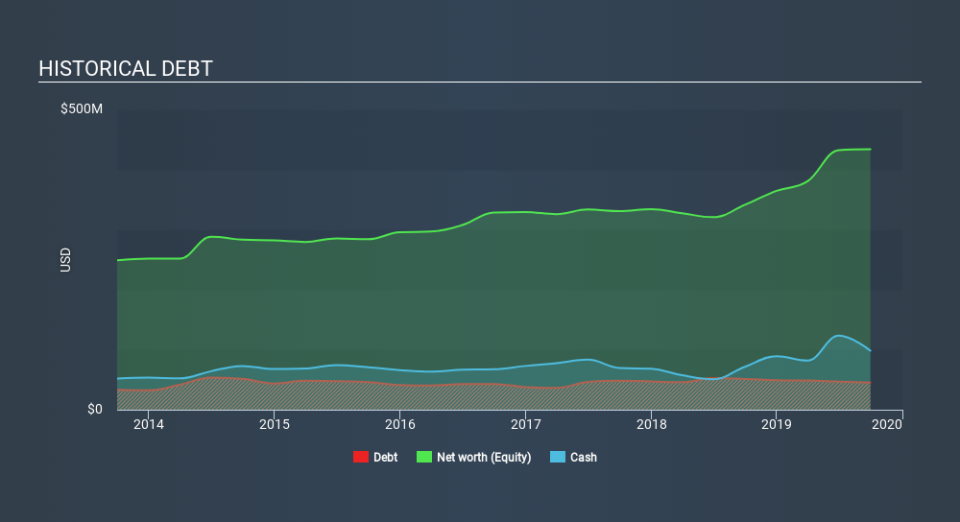Amphastar Pharmaceuticals (NASDAQ:AMPH) Could Easily Take On More Debt

The external fund manager backed by Berkshire Hathaway's Charlie Munger, Li Lu, makes no bones about it when he says 'The biggest investment risk is not the volatility of prices, but whether you will suffer a permanent loss of capital. So it seems the smart money knows that debt - which is usually involved in bankruptcies - is a very important factor, when you assess how risky a company is. We can see that Amphastar Pharmaceuticals, Inc. (NASDAQ:AMPH) does use debt in its business. But the real question is whether this debt is making the company risky.
When Is Debt Dangerous?
Debt assists a business until the business has trouble paying it off, either with new capital or with free cash flow. Part and parcel of capitalism is the process of 'creative destruction' where failed businesses are mercilessly liquidated by their bankers. While that is not too common, we often do see indebted companies permanently diluting shareholders because lenders force them to raise capital at a distressed price. Of course, plenty of companies use debt to fund growth, without any negative consequences. When we examine debt levels, we first consider both cash and debt levels, together.
See our latest analysis for Amphastar Pharmaceuticals
How Much Debt Does Amphastar Pharmaceuticals Carry?
The image below, which you can click on for greater detail, shows that Amphastar Pharmaceuticals had debt of US$45.0m at the end of September 2019, a reduction from US$51.2m over a year. However, it does have US$98.3m in cash offsetting this, leading to net cash of US$53.2m.
A Look At Amphastar Pharmaceuticals's Liabilities
The latest balance sheet data shows that Amphastar Pharmaceuticals had liabilities of US$86.6m due within a year, and liabilities of US$65.4m falling due after that. Offsetting this, it had US$98.3m in cash and US$46.1m in receivables that were due within 12 months. So its liabilities outweigh the sum of its cash and (near-term) receivables by US$7.56m.
This state of affairs indicates that Amphastar Pharmaceuticals's balance sheet looks quite solid, as its total liabilities are just about equal to its liquid assets. So while it's hard to imagine that the US$938.3m company is struggling for cash, we still think it's worth monitoring its balance sheet. While it does have liabilities worth noting, Amphastar Pharmaceuticals also has more cash than debt, so we're pretty confident it can manage its debt safely.
Although Amphastar Pharmaceuticals made a loss at the EBIT level, last year, it was also good to see that it generated US$1.8m in EBIT over the last twelve months. There's no doubt that we learn most about debt from the balance sheet. But ultimately the future profitability of the business will decide if Amphastar Pharmaceuticals can strengthen its balance sheet over time. So if you want to see what the professionals think, you might find this free report on analyst profit forecasts to be interesting.
Finally, a business needs free cash flow to pay off debt; accounting profits just don't cut it. Amphastar Pharmaceuticals may have net cash on the balance sheet, but it is still interesting to look at how well the business converts its earnings before interest and tax (EBIT) to free cash flow, because that will influence both its need for, and its capacity to manage debt. Happily for any shareholders, Amphastar Pharmaceuticals actually produced more free cash flow than EBIT over the last year. That sort of strong cash conversion gets us as excited as the crowd when the beat drops at a Daft Punk concert.
Summing up
We could understand if investors are concerned about Amphastar Pharmaceuticals's liabilities, but we can be reassured by the fact it has has net cash of US$53.2m. And it impressed us with free cash flow of US$2.9m, being 166% of its EBIT. So we don't think Amphastar Pharmaceuticals's use of debt is risky. The balance sheet is clearly the area to focus on when you are analysing debt. But ultimately, every company can contain risks that exist outside of the balance sheet. Be aware that Amphastar Pharmaceuticals is showing 1 warning sign in our investment analysis , you should know about...
If, after all that, you're more interested in a fast growing company with a rock-solid balance sheet, then check out our list of net cash growth stocks without delay.
If you spot an error that warrants correction, please contact the editor at editorial-team@simplywallst.com. This article by Simply Wall St is general in nature. It does not constitute a recommendation to buy or sell any stock, and does not take account of your objectives, or your financial situation. Simply Wall St has no position in the stocks mentioned.
We aim to bring you long-term focused research analysis driven by fundamental data. Note that our analysis may not factor in the latest price-sensitive company announcements or qualitative material. Thank you for reading.

 Yahoo Finance
Yahoo Finance 
